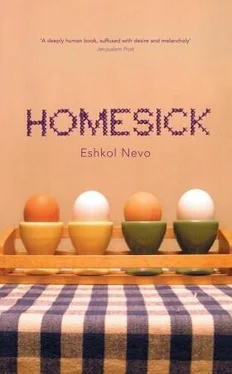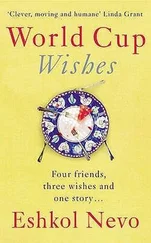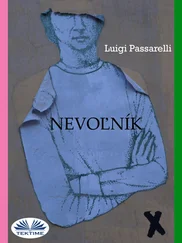Eshkol Nevo - Homesick
Здесь есть возможность читать онлайн «Eshkol Nevo - Homesick» весь текст электронной книги совершенно бесплатно (целиком полную версию без сокращений). В некоторых случаях можно слушать аудио, скачать через торрент в формате fb2 и присутствует краткое содержание. Год выпуска: 0101, ISBN: 0101, Издательство: Random House, Жанр: Современная проза, на английском языке. Описание произведения, (предисловие) а так же отзывы посетителей доступны на портале библиотеки ЛибКат.
- Название:Homesick
- Автор:
- Издательство:Random House
- Жанр:
- Год:0101
- ISBN:9781448180370
- Рейтинг книги:5 / 5. Голосов: 1
-
Избранное:Добавить в избранное
- Отзывы:
-
Ваша оценка:
- 100
- 1
- 2
- 3
- 4
- 5
Homesick: краткое содержание, описание и аннотация
Предлагаем к чтению аннотацию, описание, краткое содержание или предисловие (зависит от того, что написал сам автор книги «Homesick»). Если вы не нашли необходимую информацию о книге — напишите в комментариях, мы постараемся отыскать её.
Homesick
Homesick — читать онлайн бесплатно полную книгу (весь текст) целиком
Ниже представлен текст книги, разбитый по страницам. Система сохранения места последней прочитанной страницы, позволяет с удобством читать онлайн бесплатно книгу «Homesick», без необходимости каждый раз заново искать на чём Вы остановились. Поставьте закладку, и сможете в любой момент перейти на страницу, на которой закончили чтение.
Интервал:
Закладка:
A rebellious thought passes suddenly through Amir’s mind: It’s pretty crowded, the two of us on this small armchair.
The camera zooms in on a clearing in the woods: a group of robed people are praying to the devil. Mulder isn’t around, of course. Scully’s hiding behind a bush. And the music gets louder. Louder. Louder. The violins screech. The drums boom. Amir wriggles around on the chair trying to find some room.
*
A fifteen-minute stop, Moshe announces on the loudspeaker. Someone yells from the back of the bus: how long? Moshe bends forward again: fifteen minutes, he repeats, and waits patiently for the last passenger to get off. He looks in the mirror, checking all the seats in the bus. The old people usually get off first, their steps small and slow. This time, it’s a soldier who’s been sleeping since he got on the bus an hour and a half ago. He’s walking down the aisle, his rifle bouncing on his back and he grabs the barrel so it won’t bang against the exit door when he gets off to buy a snack. But it does anyway. Moshe extricates himself from the narrow space between his seat and the coin dispenser, takes a last look to see that no one’s left behind and gets off the bus to unwind. A nasty wind blows hard against his face. Masmiya junction looks as if there’s been an earthquake there. The iron support of a bus stop shelter, without the shelter, is lying on the black asphalt, flyers for ‘Dr Roach — Exterminators Inc.’ are strewn everywhere. Even though there’s no supermarket in the area, an overturned supermarket trolley is lying half under a car. Just a huge, slightly menacing petrol station and a snack bar. You can buy pitta filled with an omelette, hummus and hot sauce there. Moshe has never eaten a sandwich that could compare. He stops here just so he can have one. But today, his appetite is gone. Worry keeps rising in his gorge. The fight with Sima never seems to end, and when he came home yesterday, she turned her back on him again. What’ll he do now? Without thinking, without deciding that this is what he’ll do, he goes to the payphone nearby and calls his brother, the rabbi.
I hope I’m not disturbing you, Rabbi Zakian, he says, and his brother replies, laughing to reassure him: heaven forbid, you caught me between lessons and besides, dear brother, I always have time for you. For you, anything. Moshe begins to tell him, first in half-sentences, as if he were hesitating, and then it flows out of him like a spring. All the words that he didn’t have the day before with Sima are miraculously there and he tells his brother everything. For me, God is home, he says, and for Sima, a prison. For me, God is peace, and for her, it’s like having someone watch her every move. Menachem listens patiently for a long time, hmming every once in a while so Moshe will know he’s still on the line. He lets his brother finish telling the whole story before he sighs and says: I am here for you. Then Moshe asks: but tell me what you think I should do. And Menachem replies: What I think is of no importance, and this is all I will say — the way will be illuminated for the righteous and joy will come to the upright. Moshe, not sure that he understands the meaning of the verse, persists and asks again: but what exactly should I do so things don’t get worse? Before Menachem has time to answer, someone knocks on the phone booth glass. The soldier, his eyes still red, is trying to tell him something. He uncovers his watch, presses it against the glass and shows Moshe the time. Moshe looks and is horrified. The break ended long ago. Shivers of shame run down his spine. He has to end the conversation right now. He thanks his brother, says goodbye and hurries after the soldier to the bus. The passengers are already waiting there, and one of them shouts at him: what a disgrace. How could you forget about us, the passengers on your bus? Someone else says: it’s because Egged’s a monopoly, so they do whatever they want. Mortified, Moshe makes his way through the crowd to the bus door. Nothing like this has ever happened to him before.
*
So, what do you think? I ask Noa a few mornings later, when she comes over for coffee again. Her eyes are wandering over the walls as if they are cameras and I feel bad that I didn’t have time to tidy up before she came. The only pictures we have on the walls are paintings of vases we got as gifts from some distant uncle of Moshe’s who thinks he’s Van Gogh, and giant photos of Moshe’s brothers and his parents at our wedding. So the place should at least be neat. Nu , I push her, I’m the one who talks the whole time. So what about you? What do you think? I lean on my elbows and wait for her verdict. She starts talking. Stops. Starts talking. Stops. What are you afraid of, I say and laugh at her. Tell me what you feel, from your guts, don’t think too much. But who am I to express an opinion, I’m not … she protests. I roll my eyes up to the ceiling. Don’t worry, I won’t take it like the Torah from Mount Sinai. All I want is another opinion. OK, she says, giving in, and she takes a toothpick and holds it between her fingers like a cigarette. First of all — she starts taking puffs of the toothpick — I think you should go and see that kindergarten before you decide about it. By the way, I wouldn’t mind going with you. We have a project to do on religion and God, and the truth is that we’ve already handed it in. I took pictures full of shoes in display windows to symbolise the western world’s worship of brand names, but the lecturer said I was running away from an emotional confrontation with the subject. And second of all? I ask, urging her on, and I take a toothpick too. Second of all, I think that this whole thing is deeper than whether you choose this kindergarten or a different one. Which means …? I’m still pulling her opinion out of her like you pull a tissue out of a box with an opening that’s too small. It means, she says, chewing on the toothpick, based on how strongly you feel about it, that this is all about … About a principle and you have to see whether you’re ready to give up on it. Whether you’re really ready to give up on it. Because if you’re not really ready and you give up on it anyway, it’ll keep on eating you up inside. Ow! The toothpick stabbed her tongue.
Thanks, I say. Feel like something sweet? She stares at me, surprised by the quick change of subject. She doesn’t know me yet. With me, there’s no going on and on about nothing. Once I get it, I get it. We both put our smoked toothpicks in the ashtray and I get up to empty it and bring a few biscuits. How’s things with you and Amir, I ask on the way, do you feel good in our apartment? Yes, she says, sure. You know, I tell her, that’s the first place we lived in. Right after we got married. It’s our first apartment together too, she says. There’s something strange about the way she says that. Her tone gets lower towards the end of the sentence, like lips that open up to smile and then drop at the corners. No, more like a smile that disappears too fast. I go back to the table with a full plate. She eats a biscuit and it knocks her off her feet. How … what … what is this incredible thing, she asks and takes another one from the plate and brings it up to her nose. It’s baba , I explain. Moshe’s mother taught me how to make it. Dough with a thick layer of date spread and nuts and all kinds of spices. I just have to take some for Amir, he loves sweets, she says. But again, instead of saying it happily, she says it as if she should take him some biscuits but she doesn’t really feel like it. She wets a finger and picks a few baba crumbs off the plate with it, puts the finger in her mouth and gives me a different kind of look, like she’s sizing me up, the look of a personnel manager. I fill Lilach’s bottle and wait. If she wants to, she’ll tell me. She keeps on picking up crumbs and doesn’t say anything. What’s her problem, I ask myself, insulted, I’m not good enough for her? I didn’t pass the test? So I don’t have a degree, so what. You don’t need a degree to understand people. And besides, why should I tell her about myself and about Moshe if she doesn’t tell me anything? I shush myself and put the teat into Lilach’s mouth. A minute ago you said she’d decide whether to tell you or not, so what’s your problem? I scold myself. Calm down. Just don’t blurt out some nasty remark, like you do sometimes when you feel insulted. Sharona hasn’t talked to you for two years because you told her that her little boy was fat, after she had the nerve to say something about Liron’s haircut. Better change the subject.
Читать дальшеИнтервал:
Закладка:
Похожие книги на «Homesick»
Представляем Вашему вниманию похожие книги на «Homesick» списком для выбора. Мы отобрали схожую по названию и смыслу литературу в надежде предоставить читателям больше вариантов отыскать новые, интересные, ещё непрочитанные произведения.
Обсуждение, отзывы о книге «Homesick» и просто собственные мнения читателей. Оставьте ваши комментарии, напишите, что Вы думаете о произведении, его смысле или главных героях. Укажите что конкретно понравилось, а что нет, и почему Вы так считаете.












